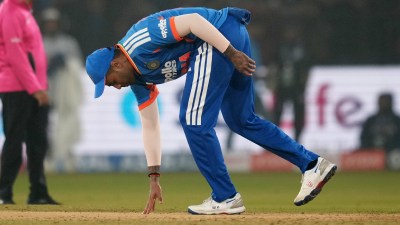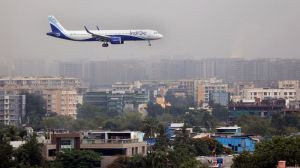Regime change can’t be forced, says PM
Making a case against unilateral military intervention in Iraq, Prime Minister Atal Behari Vajpayee said that any such move would be disastr...

Making a case against unilateral military intervention in Iraq, Prime Minister Atal Behari Vajpayee said that any such move would be disastrous for the world order and indicated that it would hit at the ‘‘credibility and legitimacy’’ of UN.
Addressing Parliament, Vajpayee made it clear that India was opposed to regime change through force and it should be left to the Iraqi people to decide their leader.
Spelling out India’s unambiguous and consistent stand on Iraq, Vajpayee warned that unilateralism on the Iraq issue would result in the UN being ‘‘deeply scarred’’. ‘‘The government of India would strongly urge that no military action be taken, which does not have the collective concurrence of the international community,’’ he said. But at the same time, he reiterated the urgent need for Iraq to fully comply with UN Security Council resolution 1441.
Keeping in mind the strong emotions on the issue, in an unprecedented move, one representative from each party was allowed to intervene in the Lok Sabha. Somnath Cahtterjee, Shivraj Patil and Ramji Lal Suman spoke in the Lok Sabha.
Prakash Mani Tripathi of the BJP raised a point of order but was told by Speakerr Manohar Joshi that ‘‘it was fine to break the convention in this case.’’
Replying to clarifications from Opposition leaders on reports that the US wanted to remove Iraqi President Saddam Hussein, Vajpayee said ‘‘Governments should be changed by the people and established by them. No outside force should be allowed to change a regime.’’
He was very clear that no action be taken without the Security Council’s consent. Though when the Opposition pressed him further on what the government would do in case the Security Council agreed, he said ‘‘ We would deal with it when the time comes.’’
Congress leader Natwar Singh said that as a friend of the US, did the Prime Minister ask the US President whether he genuinely believed that it posed a security threat to the US. ‘‘The entire nation awaits whether the Prime Minister condoned, condemned or kept quiet,’’ said Singh.
Referring to his telephone conversation with US President George Bush, Vajpayee said he had conveyed to him that the matter should be resolved peacefully and the goal could be achieved without military action. He hoped wisdom prevailed and confrontation was avoided.
Vajpayee assured the House that the government would not be lacking in protecting the nation’s interests. ‘‘Whatever we do, will be done keeping in view the nation’s prestige and world peace. Nobody should have any doubt about it… The situation can take a serious turn although we hope that it does not,’’ the Prime Minister said.
The Opposition was not happy with the PM’s statement and asked him to spell out whether India would allow its soil to be used by the US in the war against Iraq. ‘‘Yes, the war clouds are hovering. But it is very difficult to say even now whether the war will take place or not. So, I think there is no need to reply to this question,’’ Vajpayee said.
He reiterated that if permitting more time and formulation of clearer criteria can facilitate a decision within the UN framework, ‘‘this option should be given a chance’’.
Maintaining that India recognized the validity of the unanimous decision of the UN security council in its resolution 1441 on disarming Iraq, Vajpayee said it also provided a stringent regime of inspections designed to meet the international community’s desire that weapons of mass destruction were eliminated from that country.
‘‘We believe that Iraq must cooperate actively with the inspection process and comply fully with all relevant security council resolutions,’’ he said.
The Prime Minister also outlined the contingency plan drawn up by the Indian government to deal with any eventuality. He said there were less than 50 Indian nationals in Iraq at present and they have been advised to leave the country in the coming days.
‘‘It is unlikely that there would be any large-scale dislocation of Indian communities in neighbouring countries on a possible outbreak of hostilities,’’ he said. However, the Civil Aviation Ministry has drawn up plans to evacuate Indians, if necessary. Steps have also been taken by Petroleum and Natural Gas Ministry to ‘‘shore up our inventories of crude oil’’.
- 01
- 02
- 03
- 04
- 05






























